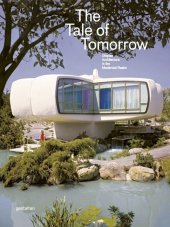 Neuerscheinungen 2016Stand: 2020-02-01 |
Schnellsuche
ISBN/Stichwort/Autor
|
Herderstraße 10
10625 Berlin
Tel.: 030 315 714 16
Fax 030 315 714 14
info@buchspektrum.de |

Sofia Borges, Sven Ehmann, Robert Klanten
(Beteiligte)
The Tale of Tomorrow
Utopian Architecture in the Modernist Realm
Herausgegeben von Borges, Sofia; Ehmann, Sven; Klanten, Robert
2016. 400 p. 13.25 in
Verlag/Jahr: DIE GESTALTEN VERLAG 2016
ISBN: 3-89955-570-8 (3899555708)
Neue ISBN: 978-3-89955-570-7 (9783899555707)
Preis und Lieferzeit: Bitte klicken
The retro-futuristic epoch is one of the most visually spectacular in architecture´s history. The utopian buildings of the 1960s and 1970s never go out of style. This book compiles radical ideas and visionary structures.
The retro-futuristic epoch is one of the most visually spectacular in architecture´s history. The utopian buildings of the 1960s and 1970s never go out of style. This book compiles radical ideas and visionary structures. The notion of utopia proves as diverse as it does universal. From exuberant master plans to singular architectural expressions, the rise of the utopian architectural movement in the 1960s and 1970s represents a critical shift in ideology away from mid-century traditionalism. This period shakes off the conformity and conventions of the 1950s in favor of a more experimental post-war agenda. Marked by groundbreaking reinterpretations of both the single family house as well as more large scale developments, the embrace of utopian and generally progressive thinking mirrored the cultural revolution of the times. These daring, charming, futuristic, and hopeful designs were not isolated to a particular part of the world. Visionary voices longing for a fresh approach to architecture began appearing across France, Japan, the United States, and beyond. The Tale of Tomorrow documents this prolific era in architecture--a time when anything felt possible as architects began to think further and further outside the box. The Tale of Tomorrow focuses exclusively on built manifestations of utopian ideas. Rather than mixing together abstract theorists with practitioners, this book focuses on the tangible embodiments of such forward thinking. Highlighting well-known projects as well as the more obscure and offbeat, the collection of utopian approaches compiled here maintain their visual power and infectious optimism nearly half a century later. These experimental structures, both large and small, appear in everyday places in stark contrast to their far-from-utopian contexts. In addition to featuring a range of whimsical architectural gestures, The Tale of Tomorrow also explores more brutalist styles of utopian thinking. This bold and iconic class of projects not only inspires a sense of awe and reverence towards one´s surroundings but also demonstrates the broad spectrum of deeply personal solutions at play as each architect began to craft their ideal world. Whether an organically shaped residence or a towering sculptural complex, the projects in this book stand as poignant suggestions of what might have been and, perhaps what could still be.
"We´ll likely never stop dreaming about what the future holds, and architecture in the 1960s through ´80s particularly reflected this forward-thinking inclination. Many of the incredible futuristic buildings from this era are highlighted in the new book The Tale of Tomorrow. Even decades later, these works by talents like Le Corbusier and Eero Saarinen are inspiring, exciting, and proof that great things happen when you push the boundaries of what can be done. Here are a few of our favorites."
Architectural Digest, April 6, 2016
"...turn to The Tale of Tomorrow, a book compiled by Robert Klanten and Sofia Borges, celebrating everything from the playful to the severe, the residential to the religious and the colourful to the concrete."
-Amuse


